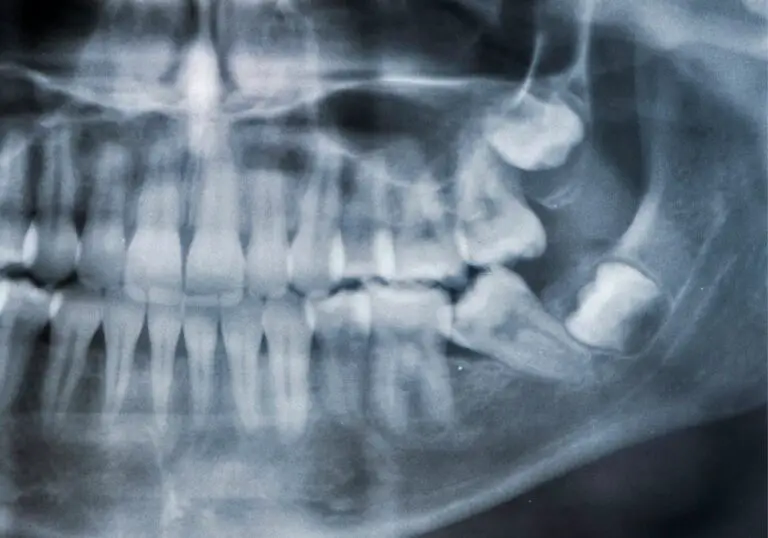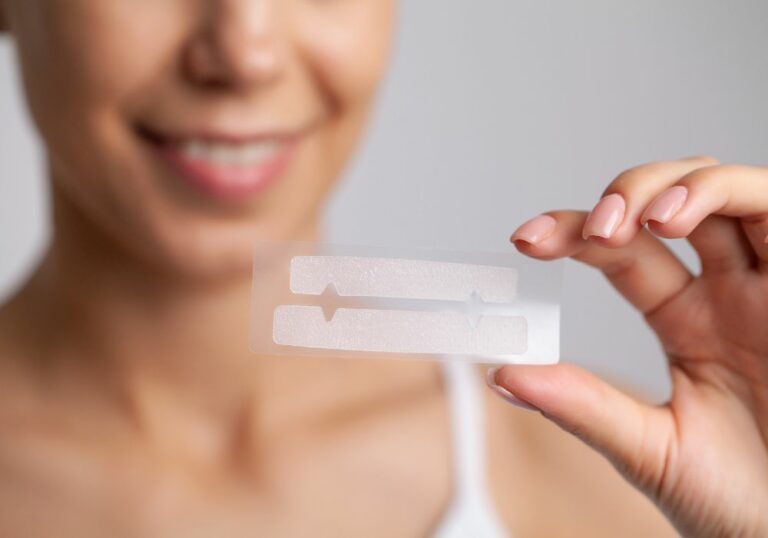A rotten tooth can produce some of the foulest odors imaginable. The pungent, nose-wrinkling stench catches people off guard and immediately triggers feelings of disgust. But what causes a rotten tooth to smell so bad? Understanding the science behind tooth decay can help explain this phenomenon.
Tooth decay occurs when plaque, a sticky film of bacteria, builds up on teeth. The bacteria feed on the sugars and starches in your food and produce acids that erode tooth enamel. This erosion causes microscopic holes to form where more bacteria can gather. As the decay process advances, it can reach the inner layers of the tooth containing blood vessels, nerves, and connective tissue. The infected inner tooth ultimately dies off and becomes a source of bad odor.
What Causes the Rotten Tooth Smell?
Several factors contribute to the unpleasant smell of a severely decayed tooth:
1. Dead Tooth Structure
At the advanced stages of tooth decay, the pulp tissue inside the tooth dies. When tissues die, they decompose and release smelly gases containing sulfur compounds. The smell of a dead tooth is akin to the foul odor of rotting meat caused by the same sulfate-reducing bacteria.
As the tooth pulp tissue necrotizes, or undergoes cell death, it becomes an ideal environment for putrefaction by oral anaerobes. These sulfur-producing bacteria thrive in the low-oxygen conditions deep within the tooth. The gases they generate, like hydrogen sulfide, methyl mercaptan, and dimethyl sulfide, produce the characteristic rotten odor.
2. Bacterial Infection
Hundreds of bacterial species reside in the mouth. Most are harmless, but some can be pathogenic and contribute to dental diseases like caries and periodontal disease. Anaerobic bacteria flourish in the low-oxygen environment deep within decayed teeth. As these bacteria feed on dead tissue in the tooth’s interior, they release smelly metabolic waste products.
Species like Porphyromonas gingivalis, Tannerella forsythia, and Treponema denticola produce pungent sulfur compounds like hydrogen sulfide, methyl mercaptan, and dimethyl sulfide that smell of rot. Fusobacterium nucleatum is another anaerobe prevalent in tooth decay that generates foul odorous butyric acid as a byproduct of sugar fermentation.
3. Food Debris Decomposition
As tooth decay advances, deep crevices form that can trap food particles and debris. Trapped carbohydrates like sugars and starches provide fuel for increased bacterial growth. The bacteria rapidly break down the food, producing foul-smelling acids, alcohols, amines, and volatile sulfur compounds.
Tongue debris, saliva, gingival crevicular fluid, and products of inflammation all mix with the decayed tooth contents. This provides a rich nutritional source for robust microbial putrefaction and even more malodorous compounds.
4. Infection Drainage
A severely decayed tooth with an exposed root canal may leak fluid and pus, which has an unpleasant taste and odor. When the tooth’s pulp tissue dies, it becomes a breeding ground for bacteria. The resulting infection produces a discharge called a fistula tract that drains from the tooth root.
This purulent exudate is composed of dead cells, food remnants, toxins, and debris from the necrotic pulp tissue. It also contains live and dead microbes and inflammatory chemicals that contribute to very foul breath.
Why is the Smell so Offensive?
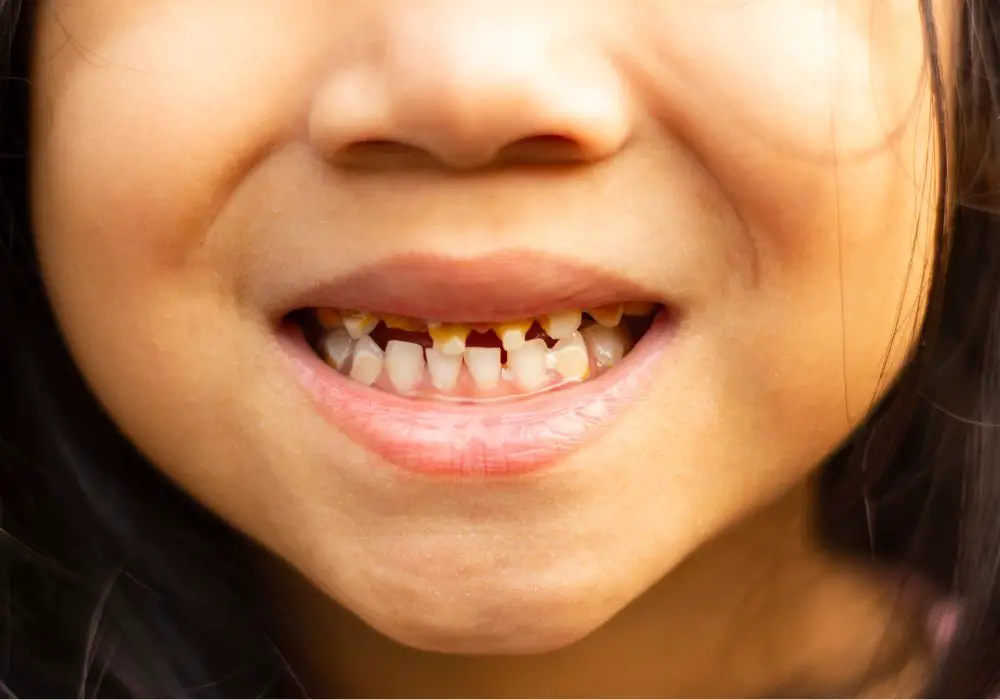
The human nose has millions of odor receptors that can detect tiny amounts of airborne molecules. Sulfur compounds like hydrogen sulfide, methyl mercaptan, and putrescine have very low odor detection thresholds in the parts per billion range. So even minuscule quantities of these molecules emitted from a rotten tooth can trigger olfactory receptors and be perceived as strong odors.
Researchers believe the human nose evolved to be highly sensitive to sulfur-containing compounds produced by pathogens. Many of the smelly molecules in rotten teeth signal bacterial infection and decaying, harmful matter that should be avoided. This stench provokes a natural aversion reaction believed to protect early humans from toxins and infectious microbes.
Today, the instinctual revulsion people feel when smelling a rotten tooth persists. The odor provides obvious evidence of underlying tooth decay and disease that requires professional treatment. Without modern dental care, such an smell advertises vulnerability to serious infections that could become life-threatening over time. The rotten tooth smell reminds people of the importance of good oral hygiene and routine dental care for preventing disease.
Consequences of a Rotten Tooth Smell
Foul odors emanating from the mouth often prompt people to seek dental care. But living with a rotten tooth smell can also bring undesirable social and health consequences:
- Embarrassment: Bad breath can be socially isolating. A person with a rotten tooth may refrain from interpersonal interactions to avoid embarrassment about the smell. They may become anxious, depressed or withdrawn.
- Loss of sleep and appetite: Constant foul taste and smell from an infected tooth can make it difficult to fall asleep or eat properly. Discomfort may disrupt sleep cycles and lead to fatigue. Poor nutrition from reduced eating can cause vitamin/mineral deficits.
- Systemic infection: Without treatment, the bacteria and toxins from a rotten tooth can enter the bloodstream through the infected pulp tissue. Hematogenous spread can disseminate pathogens throughout the body and lead to fever, sepsis, arthritis, heart valve infections, and abscesses in other organs.
- Facial swelling: A dental abscess may cause painful swelling in the face, jaw, and neck lymph nodes. The infection can spread to nearby anatomical spaces and lead to potentially life-threatening deep neck abscesses or mediastinitis.
- Tooth loss: Severe dental decay can lead to weakened teeth prone to fracture. Extensive loss of tooth structure often necessitates extraction. Missing teeth canimpact nutrition, speech, occlusion, and facial aesthetics.
Overall, the foul odor serves as an alarm signal of underlying disease requiring prompt dental intervention. Ignoring the problem allows further destruction, pain, and the risk of dangerous complications like uncontrollable infections.
How Dentists Diagnose a Rotten Tooth?
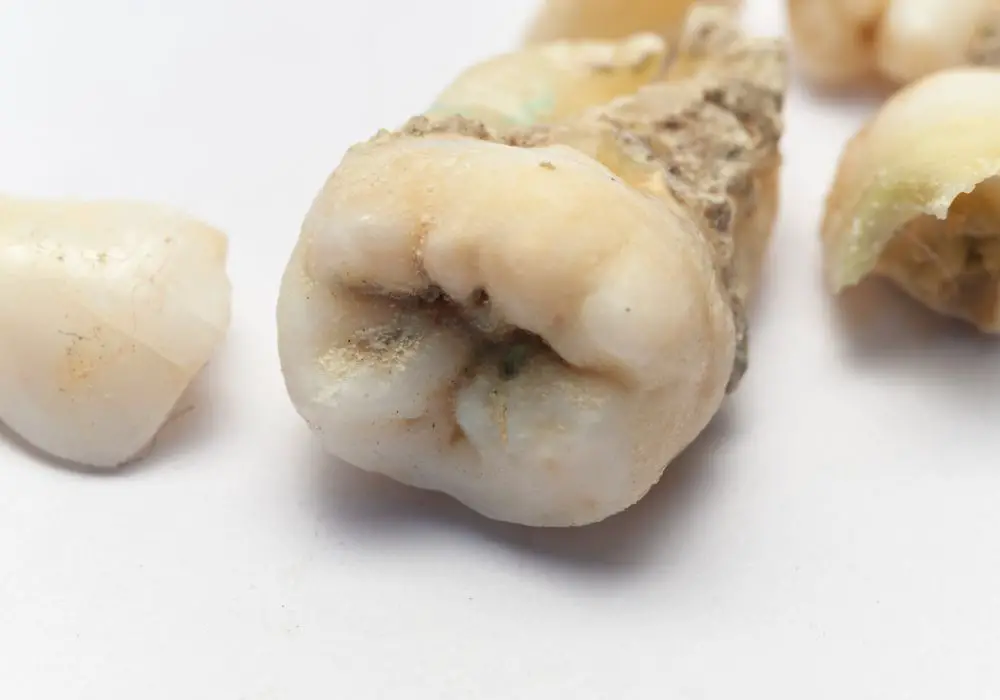
Dentists have a variety of methods to pinpoint a rotten tooth causing bad breath odor:
Visual Exam
- Careful visual inspection of the teeth, gums, and other mouth tissues. Signs of decay like holes, fractures, darkening, or breakdown help identify the affected tooth. Advanced caries may be associated with a visible fistula and drainage.
Palpation
- Palpating the gingival sulcus around tooth roots with a periodontal probe. Tenderness, bleeding, or purulent discharge indicate infection.
X-rays
- Intraoral dental x-rays, CT scans, and MRI can reveal cavities and abscesses deep within the teeth and jawbone. This aids in diagnosis and treatment planning.
Percussion
- Tapping sharply on teeth with a dental instrument. Increased pain or discomfort on percussion indicates inflammation or infection in the tooth pulp.
Mobility Testing
- Wiggling teeth with metallic instruments. Increased looseness or mobility is caused by loss of bone support due to infection. This helps identify problem teeth.
Pulp Vitality Testing
- Assessing pulp nerve health using methods like electric pulp testing, cold stimuli, and heat. Lack of response signifies pulp necrosis.
Periodontal Probing
- Measuring and recording pocket depths around teeth. Increased probing depths point to bone loss from infection.
Microbiological Studies
- Collecting plaque samples for microscopic analysis or anaerobic cultures. This identifies pathogenic bacteria.
Salivary Diagnostics
- Testing saliva for pH, proteins, or biomarkers associated with periodontal disease.
Halitosis Measurement
- Objective breath measurement using devices like gas chromatography or the OralChroma. Quantifies volatile sulfur compounds linked to oral diseases.
Combining information from the history, exams, x-rays, and lab tests allows dentists to make an accurate rotten tooth diagnosis. They can then explain the related causes of odor to patients and provide appropriate treatment.
Treatments to Eliminate a Rotten Tooth Smell
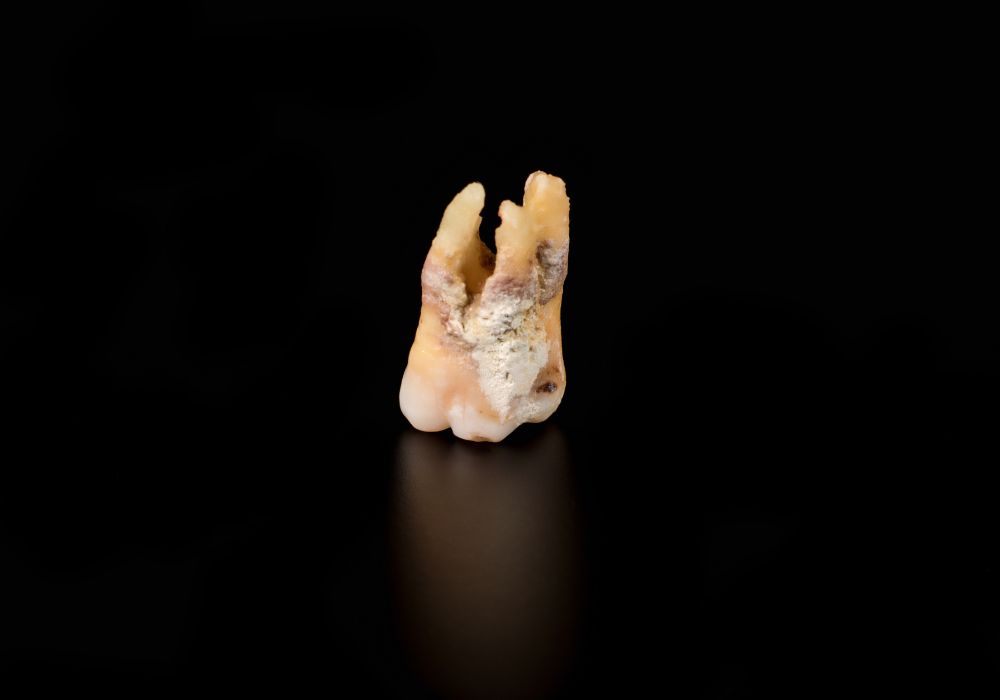
Several dental treatments can get rid of a rotten tooth odor for good:
Professional Dental Cleaning
- Removing plaque and calculus above and below the gumline eliminates odor-causing bacteria. Regular dental cleanings help prevent decay and malodor.
Restorations
- Fillings, inlays, onlays, or crowns repair cavities and strengthen weakened tooth structure. This stops decay and associated odors.
Root Canal Treatment
- Endodontic therapy removes infected, necrotic pulp and seals the inner tooth. It saves the tooth and alleviates odor.
Apicoectomy
- Surgery to remove the root tip and surrounding infection if root canal treatment fails. This stops reinfection and odors.
Antibiotics
- Prescribed antibiotics like penicillins, cephalosporins, clindamycin or amoxicillin combat bacterial infections inside teeth and gums to resolve odor.
Antimicrobial Rinses
- Chlorhexidine, cetylpyridinium chloride, essential oils or probiotics applied topically reduce malodor-causing oral bacteria.
Laser Bacterial Reduction
- Lasers disrupt bacterial cell walls and reduce pathogens in periodontal pockets. This can lessen associated odors.
Tooth Extraction
- Removing severely decayed teeth eliminates the odor source. This allows the area to heal. Extractions may be followed by tooth replacements.
Dental Implants
- Titanium implants anchored in the jawbone replace extracted rotten teeth. Restoring function and aesthetics prevents social stigma.
Regular dental visits, early cavity detection, and excellent oral hygiene can prevent rotten tooth problems. Once an odor arises, seeking dental care quickly is key to fresher breath. With modern techniques, even severely decayed teeth can often be saved.
Frequently Asked Questions
Q: Does a rotten baby tooth smell?
A: Yes, severely decayed baby teeth can produce foul odors from pulp death and bacterial overgrowth similar to permanent teeth. Seeking prompt pediatric dental care is important to treat the decay and prevent permanent tooth damage. Maintaining milk tooth health until natural exfoliation is ideal.
Q: Can I brush or rinse away the rotten tooth smell?
A: Unfortunately brushing, flossing, and mouthwash only temporarily mask the odor. Since the smell comes from diseased tooth structure and infection inside the tooth, proper dental treatment is needed to eliminate the source and odor permanently. Still, excellent oral hygiene limits bacterial growth.
Q: Should I take antibiotics for a rotten tooth smell?
A: Do not take antibiotics without a dental exam, diagnosis, and prescription. Incorrect use can worsen antibiotic resistance. Dentists identify if and when antibiotic therapy is needed to treat a tooth infection. While it may reduce smells temporarily, the most effective way to eliminate odor long-term is professional dental treatment.
Q: Does a rotten tooth smell indicate I need extraction?
A: Possibly, but not always. Based on x-rays, probing, and clinical signs, your dentist will determine if the tooth can be saved with a root canal or restoration. However, some severely decayed or fractured teeth cannot be salvaged and must be extracted to resolve infection and foul odors.
Q: When does a wisdom tooth smell bad?
A: Partially erupted or impacted wisdom teeth are prone to pericoronitis infections that cause localized bad odor and pain. Bacteria and debris easily accumulate around wisdom teeth. Regular dental exams and early removal before these problems develop is ideal.
Q: Can dentures or implants get a rotten smell?
A: Yes, denture stomatitis and peri-implant disease can cause inflammation and bacterial overgrowth that results in a foul odor around dental prosthetics. Maintaining excellent hygiene and undergoing regular professional cleanings prevents such smells.
Conclusion
A rotten tooth smell should never be ignored. The foul odor signifies rampant decay, dying tooth nerving, gum infection, or drainage from a dental abscess. While embarrassing, the smell serves an important purpose as an alarm of brewing dental dangers requiring urgent care. Understanding the science behind these odors makes clear the need for treatment to restore oral health and social confidence. With routine exams and modern dentistry, no one should suffer with a rotten tooth stench that damages their quality of life. Addressing these problems quickly leads to a happier, healthier smile and breath.

